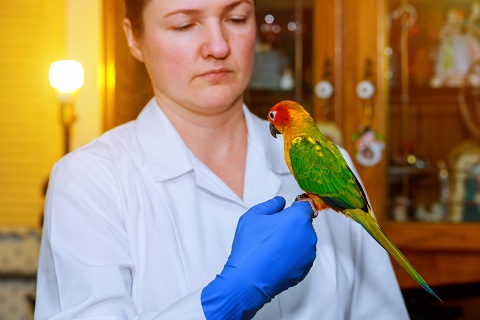Are you looking to bring an exciting and unconventional pet into your life? Exotic pets may be just what you’re searching for. While traditional dogs and cats are wonderful companions, some people desire something a bit more out of the ordinary. Whether it’s the allure of vibrant colors, intriguing behaviors, or the desire to stand out from the crowd, exotic pets offer a fascinating alternative. In this article, we’ll explore the world of exotic pets for beginners, helping you make an informed decision about the perfect unique companion for your lifestyle.
1. What Are Exotic Pets?
Exotic pets are animals that are not commonly kept as pets in most households. They encompass a wide range of species, from reptiles and amphibians to small mammals and birds.
2. Why Choose an Exotic Pet?
2.1 Uniqueness:
Exotic pets can be a conversation starter and a source of fascination for friends and family. Owning an unusual pet sets you apart from the ordinary.
2.2 Low Maintenance:
Many exotic pets are low-maintenance and require less attention than traditional pets. This can be ideal for people with busy lifestyles.
2.3 Learning Experience:
Caring for an exotic pet can be a rewarding learning experience. You’ll gain insights into different species and their unique needs.
2.4 Allergies:
Exotic pets can be a great option for individuals with allergies to common pet dander.
3. Top Exotic Pets for Beginners

3.1. Reptiles
- Snakes
- Lizards
- Turtles and Tortoises
3.2. Amphibians
- Frogs
- Salamanders
3.3. Small Mammals
- Hedgehogs
- Sugar Gliders
- Ferrets
3.4. Birds
- Parrots
- Cockatiels
4. Considerations Before Getting an Exotic Pet
Before bringing home an exotic pet, there are important factors to consider:
4.1 Legal Restrictions:
Check local and state laws regarding exotic pet ownership, as some species may be restricted or prohibited in certain areas.
4.2 Expert Advice:
Consult with a veterinarian or exotic pet specialist to ensure you understand the specific needs and care requirements of your chosen exotic pet.
4.3 Financial Commitment:
Exotic pets may require specialized diets, enclosures, and veterinary care, which can be costly. Ensure you have the financial means to provide for your pet’s needs.
4.4 Longevity:
Consider the lifespan of the exotic pet you’re interested in. Some species can live for many years, so be prepared for a long-term commitment.
4.5 Selecting the Right Exotic Pet
Selecting the right exotic pet is a critical decision. Consider factors like your living space, lifestyle, and personal preferences. Research different species to find one that matches your level of commitment and experience.
5. Common Challenges for Exotic Pets for Beginners
Keeping an exotic pet can be a fascinating adventure, but it’s not without its challenges. Beginners, in particular, may face some common hurdles when venturing into the world of exotic pet ownership. Let’s explore these challenges and how to overcome them.
5.1 Lack of Knowledge
One of the most significant challenges for beginners is a lack of knowledge about the specific needs of their exotic pets. Each species has unique requirements for habitat, diet, and care. Without proper research and education, you might inadvertently harm your pet.
5.2 Overcoming It:
- Research: Invest time in learning about your pet’s species. Read books, articles, and consult reputable online resources.
- Seek Expert Advice: Reach out to experienced exotic pet owners or join online forums dedicated to your chosen species.
- Consult a Veterinarian: Find a veterinarian who specializes in exotic animals. They can provide guidance on care and health.
5.3 Finding Proper Veterinary Care
Not all veterinarians are knowledgeable about exotic pets. Finding a qualified exotic pet veterinarian can be challenging, especially in remote areas.
- Research in Advance: Before getting your exotic pet, research and locate a veterinarian experienced with your chosen species.
- Networking: Ask for recommendations from fellow exotic pet owners or local animal clubs.
- Online Directories: Utilize online directories of exotic pet veterinarians to find one near you.
5.4 Legal Restrictions
Exotic pet ownership is subject to various legal restrictions, which can vary greatly by location. Some animals may be outright prohibited, while others require permits or licenses.
- Check Local Laws: Research your local, state, and national laws regarding exotic pet ownership. Be sure you comply with all regulations.
- Permit Application: If necessary, apply for the required permits well in advance.
- Educate Yourself: Understand the ethical implications of owning an exotic pet and ensure you are contributing to conservation efforts.
5.5 Behavioral Challenges
Exotic pets may exhibit unusual behaviors, and some species can be more challenging to train or socialize than traditional pets like dogs or cats.
- Patience and Consistency: Be patient and consistent in training and socializing your exotic pet.
- Consult Experts: Seek advice from trainers or behaviorists experienced with your specific species.
- Provide Enrichment: Offer mental and physical stimulation to prevent boredom and destructive behavior.
5.6 Health Issues

Exotic pets can be susceptible to various health issues, and diagnosing and treating them can be complex.
- Regular Check-ups: Schedule regular veterinary check-ups to catch health problems early.
- Diet and Habitat Maintenance: Ensure your pet’s diet and habitat are appropriate to prevent common health issues.
- Emergency Plan: Have an emergency plan in place in case your pet becomes seriously ill.
5.7 Long-Term Commitment
Many exotic pets have longer lifespans than traditional pets, requiring a significant long-term commitment.
- Consider Lifespan: Understand the potential lifespan of your pet and be prepared for a commitment that could span decades.
- Plan for Care: Make arrangements for your pet’s care in case you can no longer provide it.
Exotic pet ownership for beginners can be immensely rewarding, but it comes with its share of challenges. With dedication, education, and proper planning, these challenges can be overcome, allowing you to enjoy a unique and fulfilling relationship with your exotic companion.
5.8 Setting Up Their Habitat
Creating a suitable habitat is essential for your exotic pet’s well-being. This involves selecting the right enclosure, providing proper heating and lighting, and ensuring a safe and enriching environment.
5.9 Handling and Socialization
Building trust and a bond with your exotic pet is a gradual process. Be patient and allow them to get used to your presence. Proper handling techniques are essential to minimize stress for both you and your pet.
Invest time and effort in bonding with your exotic pet. Learn their behaviors and preferences, and provide mental stimulation and interaction to strengthen your connection.
Here are concise answers to those Frequently asked questions about Exotic pets for beginners:
The easiest exotic pet to care for largely depends on your preferences and lifestyle. Generally, some beginner-friendly options include leopard geckos, hermit crabs, and certain species of tarantulas.
Capuchin monkeys and some species of parrots, like cockatiels and budgerigars, are often considered among the most friendly exotic pets. However, each pet’s temperament varies, so socialization and training play crucial roles.
The cuteness of a pet is subjective, but some people find animals like sugar gliders, chinchillas, and ferrets to be incredibly adorable due to their small size and charming appearances.
Choosing an exotic pet involves researching different species, considering your lifestyle, available space, and commitment level. Consulting with experienced owners and veterinarians can help you make an informed decision.
Profitability in exotic animal ownership can be complex and depends on various factors, including legality, demand, and expertise. Some profitable options may include breeding rare reptiles, such as ball pythons, or investing in exotic fish breeding.
Exotic pets can range from being relatively common, like certain reptiles and birds, to extremely rare, such as exotic big cats or endangered species. Rarity depends on the specific animal and its availability in the pet trade. Always consider ethical and legal aspects when acquiring exotic pets.
Conclusion
Exotic pets can bring a sense of wonder and uniqueness to your life. While they may not be for everyone, they offer a rewarding experience for those willing to invest time and effort into their care. Remember that research, preparation, and a genuine love for animals are key to providing a happy and healthy life for your exotic pet. So, whether you choose a bearded dragon, a hedgehog, or a tarantula, your journey into the world of exotic pet ownership promises excitement and fulfillment like no other.